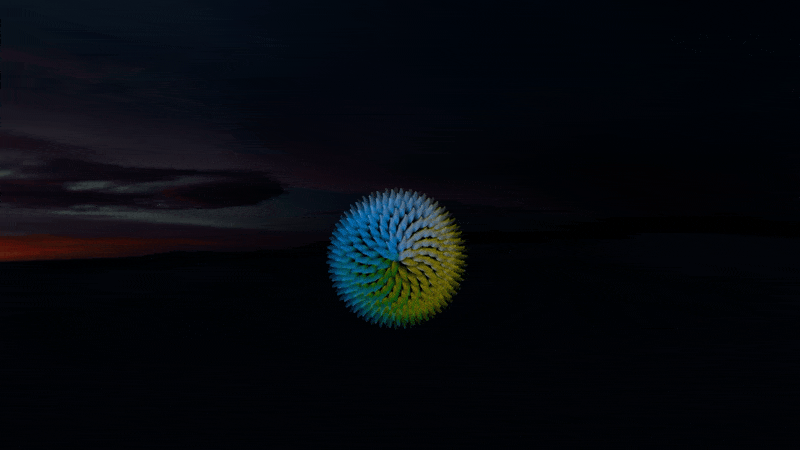ARTICLE AD
More than anything, Apple’s Vision Pro is a beginning. There are moments while using it that feel like a porthole into a different world and — just maybe — the future. It’s imperfect, sure, but it’s an undeniable accomplishment after so many decades of extended reality false starts. Using the headset for even a few minutes is a mesmerizing experience but, perhaps more importantly, offers tangible glimpses into where things are going.
I’ve long been a sucker for mindfulness apps. That’s not to say that I use them much these days, but it feels like I’ve tried every one. One key thing that engaging with a Headspace or Calm lacks on a phone or tablet is immersion. It’s hard to overstate how powerful a tool immersion is, particularly for those who are just beginning their practice. It’s something the Vision Pro has in spades.
Much like the world of AR and VR, my own practice has been littered with false starts. Meditation is hard. Full stop. Even seasoned veterans have difficulty silencing noisy brains. It’s far more difficult when first attempting to get your footing. It can be frustrating and anxiety-inducing, effectively having the opposite of the intended effect; but you have to be patient, committed and willing to put in the time if you’re going to push through.
Along with the apps, I’m a sucker for trying out pretty much any piece of hardware that promises to help kickstart a mindfulness practice. They are, as you’ve no doubt surmised, largely crap — the kind of plastic garbage that gets used twice and then stashed in a drawer until your family gets things for your estate sale. (Here I will carve out a caveat for Muse’s clever meditation band — that one genuinely helped me along.)
I’ve always found mindfulness to be one of the most compelling use cases for extended reality. Again, it’s that sense of full immersion that does so much heavy lifting, drowning out life’s distractions. Well, to a point. My jarring NYC apartment buzzer went off right in the middle of this morning’s session. There’s only so much you can do. As for the cluttered apartment, the whine of the radiator, the rabbit rustling and my yell-talking neighbors, pop in a pair of AirPods Pro and you’re off the races.
Apple has offered Mindfulness on the iPhone and Apple Watch for a while now. It’s a basic app, primarily targeted on breathing. It lacks the complexity and content of apps like Calm, but anyone who’s ever successfully meditated will gladly tell you how important breathing is to the process. It’s like the drums in a rock track — it’s centering and constant.

Image Credits: Apple
Here’s Zen monk Shunryu Suzuki from his seminal 1970 book, “Zen Mind, Beginner’s Mind”:
When we practice zazen our mind always follows our breathing. When we inhale, the air comes into our inner world. When we exhale, the air goes out to the outer world. The inner world is limitless, and the outer world is also limitless. We say “inner world” or “outer world,” but actually there is just one whole world. In this limitless world, our throat is like a swinging door. The air comes in and goes out like someone passing through a swinging door.
If you think “I breathe,” the “I” is extra. There is no you to say “I.” What we call “I” is just a swinging door which moves when we inhale and when we exhale. It just moves; that is all. When your mind is pure and calm enough to follow this movement, there is nothing: no “I,” no world, no mind nor body; just a swinging door.
The Vision Pro version of Mindfulness operates in much the same manner. An image like a circle of flower pedals expands and contracts to help you center your breathing, while a narrator offers a guided meditation. It’s simple, like the best parts of Zen.
Couple it with the headset’s Environment offers (effectively 3D desktop wallpaper for the world around you) and you’ve got an appropriate level of immersion that forces you to focus on the app, which forces you to focus on your breathing, making you mindful of a powerful and important aspect of our lives that most people take for granted most of the time. Suddenly, you’re meditating on a sandy beach or the moon.
It’s the kind of tool I would have loved to have had access to in those early days when I struggled so hard to focus. It’s also a much welcome respite in a device that is half-productivity, half-entertainment.
Apple’s Mindfulness app is hardly the end all, be all for the space. It’s the tip of the iceberg, but a hopeful tip. When such a basic app can have such a powerful effect, it’s exciting to think about the direction devs might go in, both in terms of mindfulness tools and altered states. Sorry, I can’t help sounding like late-period Timothy Leary when I write about this stuff, but I’m very much looking forward to seeing where this goes.

 9 months ago
29
9 months ago
29 

